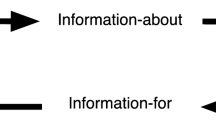Abstract
This essay responds to Wacquant’s call for a “Carnal Sociology”—an approach best realized through a method Wacquant calls “enactive ethnography.” In this essay, I explore the ways in which certain aspects of Wacquant’s carnal sociology—specifically the sentient, the sedimented and the situated—can enhance our understanding of cognition and meaning-making. I reference an ongoing research project on the deciphering of olfactory messages to make my case.


Similar content being viewed by others
Notes
This research is in the preliminary stages. But some exploratory findings can be found in Cerulo (2015).
The sales materials distributed with each perfume describe the manufacturers desired customer base; materials also suggest sales “pitches” that clerks might use to lure customers toward a purchase.
It is worth noting that I gathered my data via focus group interviews. Wacquant describes “enactive ethnography” as the preferred method for gathering data on the sentient, sedimented and situated aspects of experience. He argues that enactive ethnography allows the researcher “to master in the first person, intus et in cute, the prediscursive schemata that make up the competent, diligent, and appetent member of the universe under examination.” I argue that the triangular approach of analyzing or deconstruicting the olfactory object, smelling the scents with study participants, and dialoging about the meanings participants attribute to a fragrance proves equally illuminating in studying the deciphering of olfactory meaning.
References
Cerulo, Karen A. 2010. Mining the intersections of cognitive sociology and neuroscience. Poetics 38(2): 115–132.
Cerulo, Karen A. 2014. Continuing the story; Maximizing the intersections of cognitive science and sociology. Sociological Forum 29(4): 1012–1019.
____. 2015. The Sweet Smell of …: Brain, Mind and Body in Olfactory Evaluation. Presented at the annual Meetings of the Eastern Sociological Society, New York, NY, February.
Ignatow, Gabriel. 2007. Theories of embodied knowledge: New directions for cultural and cognitive Sociology? Journal for the Theory of Social Behaviour 37(2): 115–135.
Ignatow, Gabriel. 2009. Culture and embodied cognition: Moral discourses in Internet support groups for overeaters. Social Forces 88(2): 643–669.
Ignatow, Gabriel. 2014. Ontology and method in cognitive sociology. Sociological Forum 29(4): 990–994.
Lizardo, Omar. 2012. Embodied culture as procedure: Cognitive science and the link between subjective and objective culture. In The habits of consumption. Collegium: studies across disciplines in the humanities and social sciences, volume 12, ed. A. Warde and D. Southerton, 70–86. Helsinki: Helsinki Collegium of Advanced Studies.
Lizardo, Omar. 2014. Beyond the Comtean schema: The sociology of culture and cognition versus cognitive social science. Sociological Forum 29(4): 983–989.
Mead, George Herbert. 1962/1934. Mind, self and society: from the standpoint of a social behaviorist, ed. C. W. Morris. Chicago: University of Chicago Press.
Wacquant, Loic. Forthcoming. 2015. For a sociology of flesh and blood. Qualitative Sociology 38 (1).
Author information
Authors and Affiliations
Corresponding author
Rights and permissions
About this article
Cite this article
Cerulo, K.A. The Embodied Mind: Building on Wacquant’s Carnal Sociology. Qual Sociol 38, 33–38 (2015). https://doi.org/10.1007/s11133-014-9296-6
Published:
Issue Date:
DOI: https://doi.org/10.1007/s11133-014-9296-6




